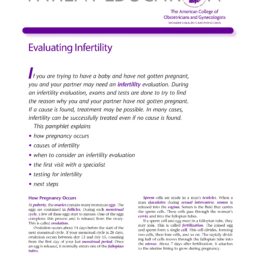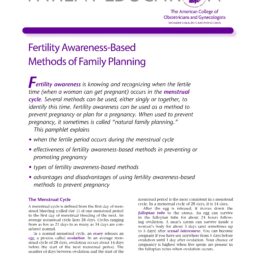Fertility Screening and Counseling
Services: Fertility
Fertility Screening & Counseling
Whether you are expecting a baby or are concerned for your health, we offer comprehensive genetic counseling. Our genetic counseling services provide personalized testing and information about diseases and disorders in your family to determine if risk factors may be present.
The most common cause of female infertility is a problem with ovulation. The most common cause of male infertility is a problem with sperm cells and how they function. Other factors that may affect fertility include age, lifestyle, and health conditions.
An infertility evaluation includes exams and tests to find why you and your partner have not gotten pregnant.

Infertility Risk Factors
- Ovulation Problems
The most common cause of female infertility is a problem with ovulation. The most common cause of male infertility is a problem with sperm cells and how they function. Other factors that may affect fertility include age, lifestyle, and health conditions.
- Lifestyle
Women underweight, overweight, or exercising too much may have a more challenging time getting pregnant. In women, drinking alcohol at moderate or heavy levels and smoking may reduce fertility. Smoking, heavy drinking, and using marijuana can lower sperm count and movement in men.
- Blocked or Scarred Fallopian Tubes
Laparoscopy—This procedure uses a camera with a thin light source inserted through the abdomen. This can show the fallopian tubes, ovaries, and the outside of the uterus.
- Age
For healthy couples in their 20s or early 30s, a woman’s chance of becoming pregnant is about 25 to 30 percent in any single menstrual cycle. This percentage starts to decline in a woman’s early 30s. It declines more rapidly after age 37.
By age 40, a woman’s chance of getting pregnant drops to less than 10 percent per menstrual cycle. A man’s fertility also declines with age, but not as predictably.
- Quality or Health of Sperm
In men, infertility can be caused when the tubes that carry sperm from the testicles are blocked.
- Hormones
Problems with reproductive organs or hormones cause fertility issues.
What is an infertility evaluation?
An infertility evaluation includes exams and tests to find why you and your partner have not gotten pregnant. If a cause is found, treatment may be possible. In many cases, infertility can be successfully treated even if no reason is found.
When should I consider having an infertility evaluation?
Experts recommend an infertility evaluation if you have not gotten pregnant after one year of having regular sexual intercourse without using birth control. If you are older than 35, an evaluation is recommended after six months of trying. If you are older than 40, talk with your obstetrician-gynecologist (ob-gyn) about an assessment.
What type of doctor does an infertility evaluation?
Your ob-gyn usually will do the first assessment. You also may see a reproductive endocrinologist (an ob-gyn with special training in infertility). Men may see a urologist. It is essential to find a specialist you are comfortable with.
What causes infertility?
The most common cause of female infertility is a problem with ovulation. The most common cause of male infertility is a problem with sperm cells and how they function. Other factors that may affect fertility include age, lifestyle, and health conditions. Sometimes no cause of infertility is found. This is called unexplained infertility.
How can health conditions affect fertility?
In women, several health problems can affect women’s fertility, including:
- Problems with reproductive organs or hormones
- Scarring or blockages of the fallopian tubes (from past sexually transmitted infections [STIs] or endometriosis)
- Problems with the thyroid gland or pituitary gland
In men, infertility can be caused when the tubes that carry sperm from the testicles are blocked.
Articles From Our Women's Health Library
| Thumb | Name | Size | Date |
|---|---|---|---|
 |
Evaluating-Infertility-Patient-Education.pdf
application/pdfEvaluating-Infertility-Patient-Education.pdf Open Download Copy Link 761.29 KB 2024-01-14 January 14, 2024 2024-01-08 January 8, 2024 |
761.29 KB | January 8, 2024 |
 |
Fertility-Awareness-Based-Method-Patient-Education.pdf
application/pdfFertility-Awareness-Based-Method-Patient-Education.pdf Open Download Copy Link 101.43 KB 2024-01-14 January 14, 2024 2024-01-07 January 7, 2024 |
101.43 KB | January 7, 2024 |
2
Our entire team is dedicated to you
We Help You Navigate Healthcare Decisions With Confidence
We Have Decades of Medical Experience and Providing Compassionate Care.

TEstimonials
What Our Patients Say
What an exceptional experience! I have never been to a nicer medical office. Ever! I was let called in after a second of completing my check in and everyone was so very nice. I wish i knew the name of the assistant that answered all our questions, she was very nice and informative. Don’t hesitate ladies!
The staff and everyone I met on the care team were extremely warm, kind, and knowledgeable. Although visit times are short, they made sure to explain everything thoroughly and made sure I understood. Even though they spoke quickly (lots of info to share in a short 15 minute slot) I never felt rushed or dismissed. I highly recommend this location and especially Dawn.
